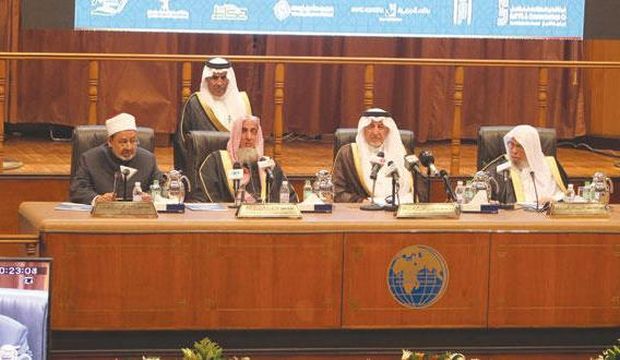
(From L-R) Al-Azhar Grand Imam Sheikh Ahmed Al-Tayeb, Saudi Grand Mufti Sheikh Abdulaziz Al Al-Sheikh, Governor of Mecca Prince Khalid Al-Faisal Bin Abdulaziz, and Sheikh Abdullah Al-, the secretary-general of the Muslim World League, speak on a conference panel on the first day of the ‘Islam and the Fight Against Terrorism’ conference organized by the Muslim World League, in Mecca, Saudi Arabia, on February 22, 2015. (Asharq Al-Awsat/Ahmed Hashad)
Mecca, Asharq Al-Awsat—Saudi Arabia will spare no effort in the global and regional fight against extremism and terrorism, Custodian of the Two Holy Mosques King Salman Bin Abdulaziz said on Sunday.
“Our security services have been relentless in blocking the efforts of terrorists,” the King said in a speech given on his behalf by Prince Khalid Al-Faisal Bin Abdulaziz, the Governor of Mecca and an Adviser to the Saudi Royal Court.
Prince Khalid was representing the Custodian of the Two Holy Mosques at the opening of a three-day anti-terrorism and anti-extremism conference, ‘Islam and the Fight Against Terrorism,’ in Mecca, organized by global umbrella group the Muslim World League.
In the speech King Salman described terror groups around the world as representing “a grave threat to our Islamic Umma [the global Islamic community] and the entire world,” adding that the crimes committed by members of terror groups, whom he described as being “misguided and misguiding,” had now “exceeded the limits set forth in our Islamic world.”
King Salman also addressed how acts committed by global terror groups such as the Islamic State of Iraq and Syria (ISIS) and Al-Qaeda affiliate the Al-Nusra Front were affecting relations between Muslims and other peoples from across the globe.
He said such groups had “given an excuse to those already against Islam and who seek to harm it to vilify our upright and rightly guided faith whose followers number 1.5 billion people around the world and who are now associated with this mindless faction which has no relation to Islam in any way.”
King Salman said relations between Muslims and others around the world had now as a result become “shaken and have deteriorated in the midst of this wave of negativity and prejudice against Muslims which follows whenever terrorist incidents take place.”
Also speaking on the first day of the conference was Sheikh Ahmed Al-Tayeb, the Grand Imam of Al-Azhar in Cairo, the foremost Sunni Islamic learning institution in the world.
He said the Islamic world was currently under attack by a “plague” of extremist thinking which has bred such groups as ISIS and Al-Nusra, and maintained that the solution to preventing countless people becoming radicalized lay in reforming Islamic education programs in Muslim countries which had become infiltrated with “extreme and incorrect interpretations of Islam” utterly to the Islamic world throughout its 1,400-year history.
Tayeb said without this overhaul of religious education in Islamic countries there could be “no hope of this Umma regaining its strength, unity, and sense of brotherliness, as well as its ability to develop and keep up with countries in the developed world.”
Tayeb praised Saudi Arabia’s role in combating terrorism and urged for greater cooperation between countries affected by terrorism—each of which, he said, had had “its own unique experience” in dealing with the phenomenon—and the “doubling of efforts” globally to combat terror groups around the world.
Tayeb also called for a multi-pronged approach in the Islamic world to combat global terror and its causes, including cooperation between different religious, educational, and media institutions to prevent young people from becoming drawn into extremist thinking and joining terrorist groups.
